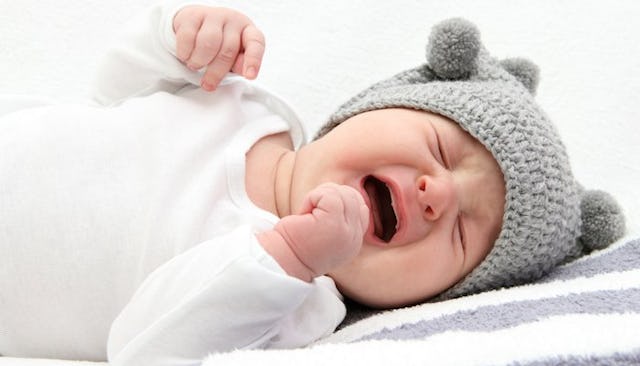You're Not A Sh*tty Parent, Some Babies Are Just Easier Than Others

Some babies are just more difficult, no matter what their parents do
As parents, we don’t like to believe there’s such a thing as “hard” babies or “easy” babies. We like to think we’re mostly in control, and we feel guilty when our kids are especially difficult, fussy, picky, or otherwise complex. There are endless ways to feel like you’re doing a shitty job at parenting, but in reality, some kid behaviors have nothing to do with us at all. As Dr. Perri Klass put it in the New York Times this week, “some babies are just easier than others.”
Pediatrician Perri Klass wrote an enlightening essay about the differences between kids and how her work as a doctor has taught her that some babies are just difficult. Poor sleeping, picky eating, attachment issues — they’re all seen as signs of parents screwing something up or not practicing the right parenting method, but Klass says that’s actually not the case at all.
“Within the range of developmentally normal children, some parents have a much, much harder job than others,” writes Klass. “Babies and children are different… and we spend a lot of time patting ourselves on the back — as parents and as pediatricians — when the easy babies and toddlers behave like themselves, and a lot of time agonizing and assigning blame when the more difficult kids run true to form.”
Klass says her first baby was a terrible sleeper and didn’t start sleeping through the night until well after age two. Her second child, on the other hand, was a great sleeper right off the bat, even though she and her husband parented both kids the exact same way. Some things are just a part of a baby’s nature, and they won’t respond to whatever solution you come up with, regardless of whose advice you’re following.
That’s not to say that our choices and parenting styles don’t matter, of course. It’s just that our kids are individuals and sometimes certain behaviors are simply out of our control. “Sure, some struggles reflect parental practices and habits and the way those children have been reared,” writes Klass. “But ask any parent who has brought up two children of wildly different temperaments — some of it is just the kid you get dealt.”
Parenting is a tough job, and none of us are entirely sure we’re doing it right. As a result, we tend to over-estimate the amount of control we have over any given situation. If our kids love kale and Brussels sprouts, we think it’s because we introduced foods in the exact right way and we’re the greatest parents ever. If a kid is still using a pacifier at age four, we imagine we failed them somewhere along the line and they’re going to grow up to be a weirdo who still carries a stuffed animal and a blankie around their college campus.
In reality, we have way less control than we think we do, and we should stop putting so much pressure on both our kids and ourselves. Kids do things at their own pace, according to their own timeline, and chances are everyone is going to grow up to be just fine. “Sooner or later, almost everyone accepts potty training, gives up the pacifier, sleeps through the night,” Klass writes, “And given a longer distance — years stretching into decades — most of us, parents and children, do find it possible to look back and smile.”